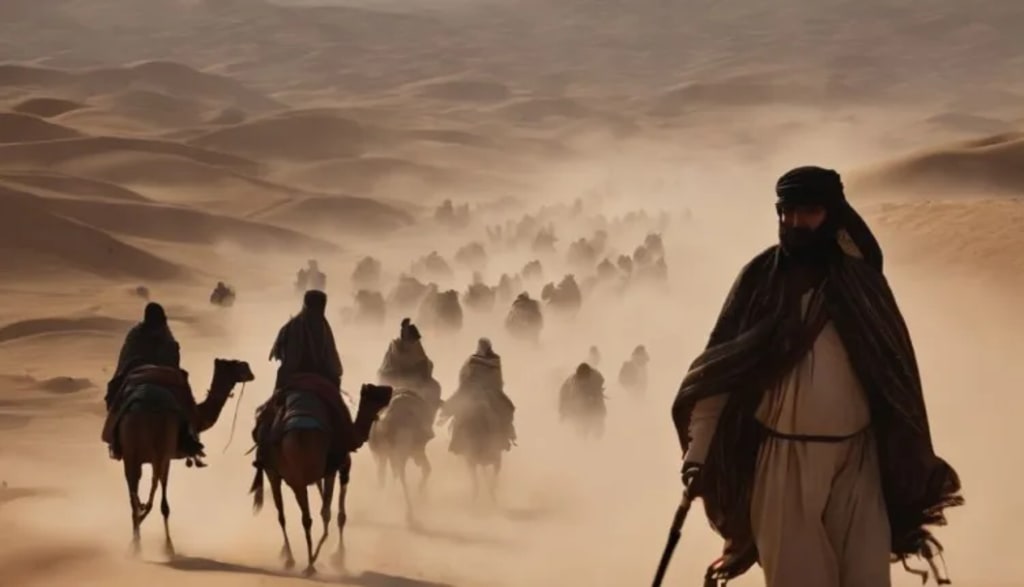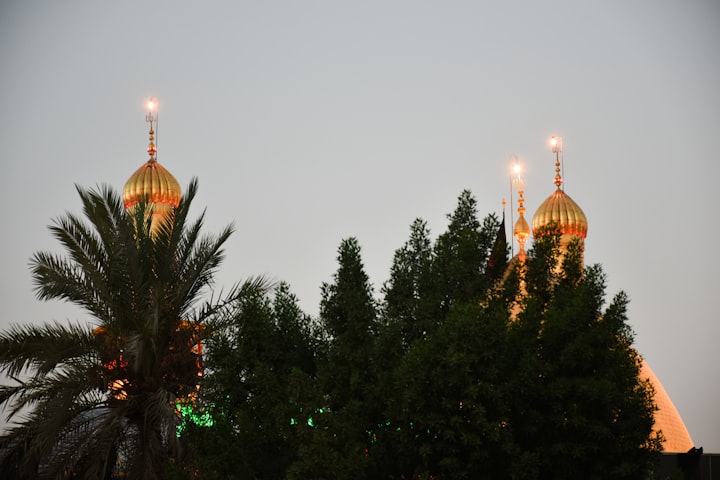A Tale of Forgiveness and Atonement
The Redemption of Ibn Harb

As the sands of time shifted, the Muslims of Arabia found themselves ascending from the margins of society to the pinnacle of power. The culmination of their journey came with the triumphant conquest of Mecca, the heart of their homeland. With victory, an unexpected proclamation echoed across the land: a general amnesty for all.
In the city of Taif, nestled amidst the rugged terrain of western Arabia, the news of Mecca's fall reverberated with astonishment and disbelief. How had the once beleaguered Muslims risen to such prominence? Whispers of their newfound strength and mercy spread like wildfire, reaching even the remote corners of Taif.
Amongst the inhabitants of Taif was Abu Wahma, a man burdened by the weight of his past transgressions. Haunted by memories of his role in the martyrdom of the Prophet Muhammad's beloved uncle, Hamza, Abu Wahma grappled with guilt and fear. How could he, a perpetrator of such a heinous act, ever hope to find redemption in the eyes of the Muslims?
His companions, sensing his inner turmoil, urged him to seize the opportunity presented by the general amnesty. "Go forth and seek forgiveness," they implored. "The Muslims have shown mercy to even their staunchest foes. Perhaps they will show the same to you."
But Abu Wahma hesitated, his heart torn between the desire for absolution and the fear of facing the consequences of his past actions. Could he truly be forgiven for the blood he had shed? Would the Muslims extend their mercy to one who had caused them such pain?
Yet as the days passed and the Muslims' influence continued to spread, Abu Wahma's resolve wavered. The realization dawned upon him that his life was in danger not only from the advancing Muslims but also from the shifting tides of allegiance within Taif itself. Many of his fellow townspeople had already embraced Islam, leaving him isolated and vulnerable.
At last, swayed by the counsel of his peers and the looming specter of his own mortality, Abu Wahma made the decision to join the delegation from Taif. With trepidation coursing through his veins, he set forth on a journey fraught with uncertainty, clinging to the faint hope of finding redemption at the end of his tumultuous path.
Upon his arrival in Mecca, Abu Wahma found himself in the presence of the Prophet Muhammad, peace be upon him, himself. As the Prophet addressed him by his true name, Ibn Harb, Abu Wahma's heart constricted with fear. Trembling, he confessed his sins, expecting nothing but condemnation and retribution.
Yet to his astonishment, the Prophet's response was one of compassion and forgiveness. "There is peace," the Prophet declared, his voice suffused with kindness. "You are safe here."
Overwhelmed by the weight of his emotions, Abu Wahma could scarcely believe his ears. Could it be true? Had he truly been granted a second chance at life, despite the darkness of his past?
As the days passed and Ibn Harb sought to reconcile his newfound freedom with the sins of his past, he found himself consumed by a burning desire for atonement. The memory of Hamza's martyrdom, a wound that had festered within him for so long, gnawed at his soul, driving him to seek redemption in the most unlikely of places.
When the shadow of Masailma Qazab, a false prophet and sworn enemy of Islam, loomed large over the horizon, Ibn Harb saw an opportunity to repay his debt to Hamza and to Allah. Joining the ranks of the Muslim army led by the famed general Khalid bin Waleed, Ibn Harb embarked on a perilous journey to confront the forces of darkness that threatened to engulf his newfound faith.
As the battle raged on the plains of Yamama, Ibn Harb's resolve remained unwavering. With the same spear that had claimed the life of Hamza, he struck down Masailma Qazab, delivering a decisive blow to the enemies of Islam and, in doing so, expiating the sins of his past.
In that moment of triumph, as the echoes of battle faded into the distance, Ibn Harb felt a weight lift from his shoulders. The burden of guilt that had plagued him for so long was finally lifted, replaced by a sense of peace and redemption that he had never thought possible.
As Ibn Harb returned to Mecca, his heart overflowing with gratitude and humility, he knew that his journey was far from over. But with each step forward, he walked not as a slave to his past, but as a servant of Allah, guided by the light of forgiveness and the promise of a brighter tomorrow.
About the Creator
Ahsan Ahmad
Meet Ahsan Ahmad, an experienced article writer with a passion for crafting engaging and informative content. With 2 years of writing experience.






Comments
There are no comments for this story
Be the first to respond and start the conversation.